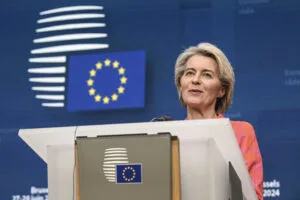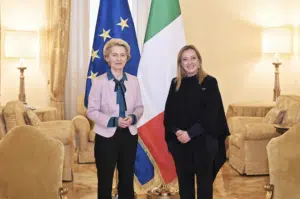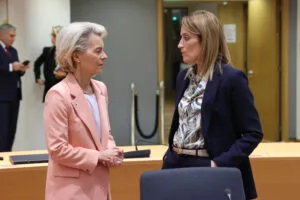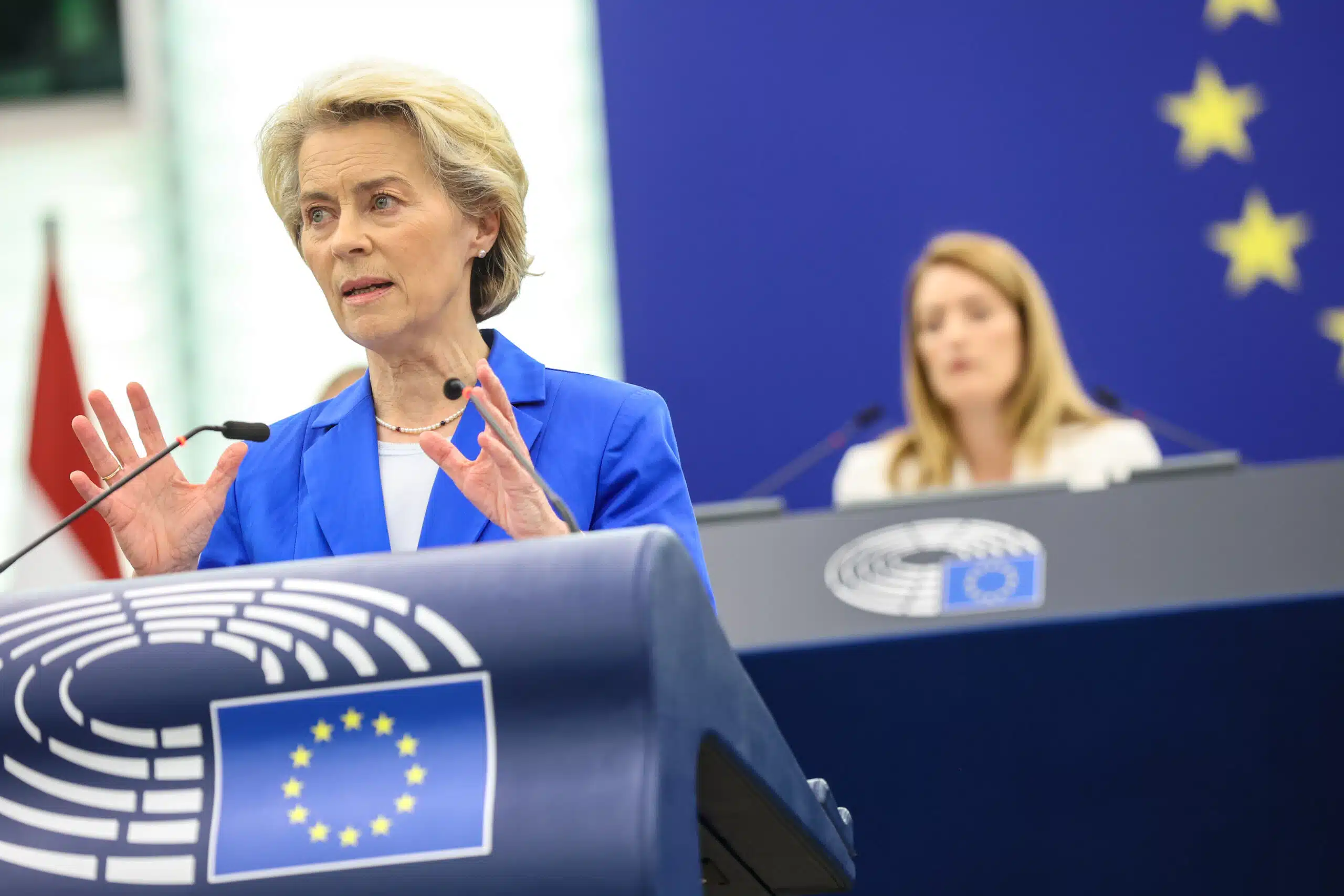Brussels – The first hurdle was cleared, but there is now another one on the horizon that Ursula von der Leyen should not underestimate if she aims for another five years at the Berlaymont. After receiving the European Council’s green light to her nomination as a candidate for the presidency of the European Commission, the number one of the outgoing EU executive must go through the test of the parliamentary vote, where she has the majority but not as solid as it might seem. Populars, Social Democrats, and Liberals, as of today, can count on 399 seats—38 more than the minimum threshold— Still, the risk of turncoats in the plenary is too high, and now von der Leyen faces three intense weeks in an attempt to shore up the majority and pass unscathed through Strasbourg’s scrutiny.

“I will work with all pro-Ukrainian, pro-EU, and pro-State of Law members of the European Parliament,” the official European Council candidate to succeed herself at the head of the Commission confirmed late last night (June 27) at a press conference, pointing out that “we are in the midst of the process of the EPP-S&D-Renew platform to convince members of other groups as well.” No explicit reference to the 24 Fratelli d’Italia MEPs of the Italian premier, Giorgia Meloni—who at the table of EU leaders abstained on von der Leyen, the only one among the Twenty-Seven except for the rejection of the Hungarian premier, Viktor Orbán—but this certainly does not mean burning bridges. “I will talk to the national delegations and go to the parliamentary groups that invite me,” von der Leyen added, leaving open the prospects for “a broad majority for a stronger Europe.”
While the group formation must be concluded by next Thursday (July 4), von der Leyen knows that, as of today, she will have to work “intensively over the next three weeks”. Although it will only be confirmed with the publication of the agenda (on July 11) of the inaugural session of the new EU Parliament, the outgoing president of the EU Parliament, Roberta Metsola (also vying for confirmation to succeed herself), said that the confirmation vote “can already be held on July 18”. However, not before “presenting my political program for the next five years,” von der Leyen pointed out to the press. But the most delicate moment will be precisely the vote of the 720 MEPs,
and we can already begin to tally.

If one considers the 2019 election, the same majority had 444 seats, yet von der Leyen had been approved by only 383 votes. It means that, compared to the majority on paper, 13.5 per cent of popular, socialist, and liberal MEPs had come up short (even more if one considers the decisive contribution of the 14 from the 5 Star Movement and the 26 from the Polish ultra-right Law and Justice). Translated into the summer of 2024—although times have changed, but not the uncertainty—would mean 54 fewer votes than the 399 provisional seats of the European People’s Party (EPP), Progressive Alliance of Socialists and Democrats (S&D) and Renew Europe groups: 345 votes in favour, 16 fewer than the minimum threshold for election.
That is why, with the favour of the secret ballot, Meloni’s real game is now played in the EU Parliament, where she can try to make her 24 votes count. But for von der Leyen, the margin would still not be wide enough to consider herself safe. Here the Green/Ale group, which, despite its major setback in the European elections and drop to 54 seats, has been calling for “responsibility” to support the majority for weeks, can get back into the game. On the one hand, opening up to MEPs who sit in the European Conservatives and Reformists (ECR) group could open cracks with social democrats and liberals; on the other hand, a propping up of the Greens could result in a flight of votes from the populars themselves. Von der Leyen’s tough task in these weeks will also be to figure out where she can force her hand and where the balances are too fragile to be touched, putting her confirmation at risk: “I have to contact the delegations that have doubts to give them answers,” reassured the outgoing Commission number one.

If she gets past the hurdle of the Strasbourg plenary, von der Leyen will have to put together the new team of European commissioners, another task of no minor importance considering that a delicate balance will have to be struck here, too, but with the 26 national governments (the German one has already spoken out, supporting her): each of them designates its own member of the College and agrees with the Commission presidency on the role and portfolio to be assigned. If July already yields von der Leyen’s name as Commission chair (if a majority fails, the European Council will have to propose another candidate within a month), the timeframe for confirmation of commissioners may be anticipated between September and October, when each parliamentary committee will review them in written questions and public hearings, each based on its area of expertise. Finally, the Conference of Presidents will have to prepare a draft resolution to be voted on in plenary (the expectation of this vote for many is after mid-November), when, by a simple majority of the votes cast, MEPs will have to approve the appointment of the entire College of Commissioners for the five-year term.
English version by the Translation Service of Withub






![Il presidente della Repubblica, Sergio Mattarella, con la presidente della Commissione europea, Ursula von der Leyen [Bruxelles, 21 maggio 2025. Foto: Emanuele Bonini per Eunews]](https://www.eunews.it/wp-content/uploads/2025/05/mattarella-vdl-120x86.png)


![Il presidente della Repubblica, Sergio Mattarella (sinistra), con il presidente del Consiglio Europeo, Antonio Costa [Bruxelles, 20 maggio 2025. Foto: Quirinale]](https://www.eunews.it/wp-content/uploads/2025/05/mattarella-costa-120x86.jpeg)